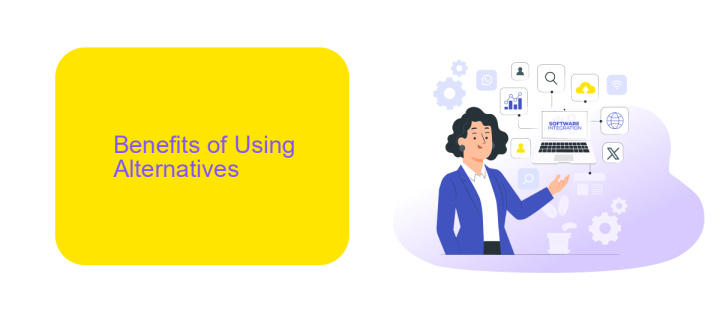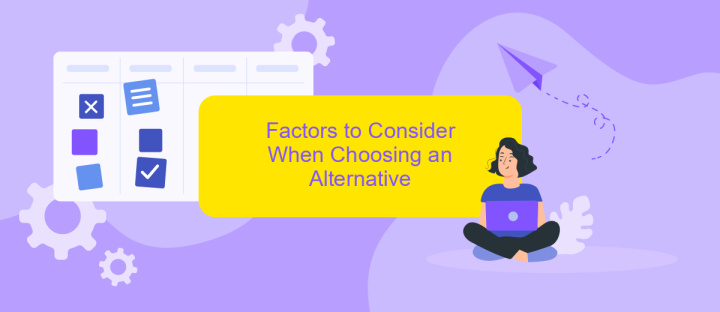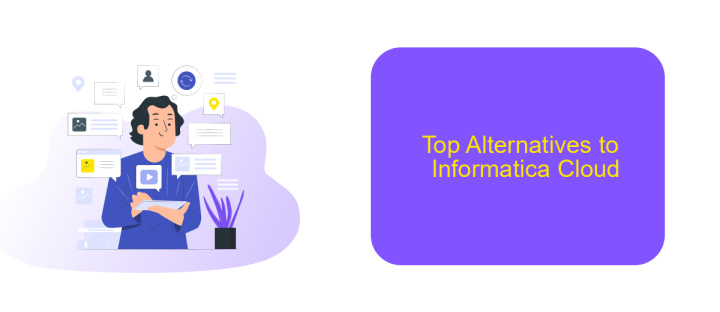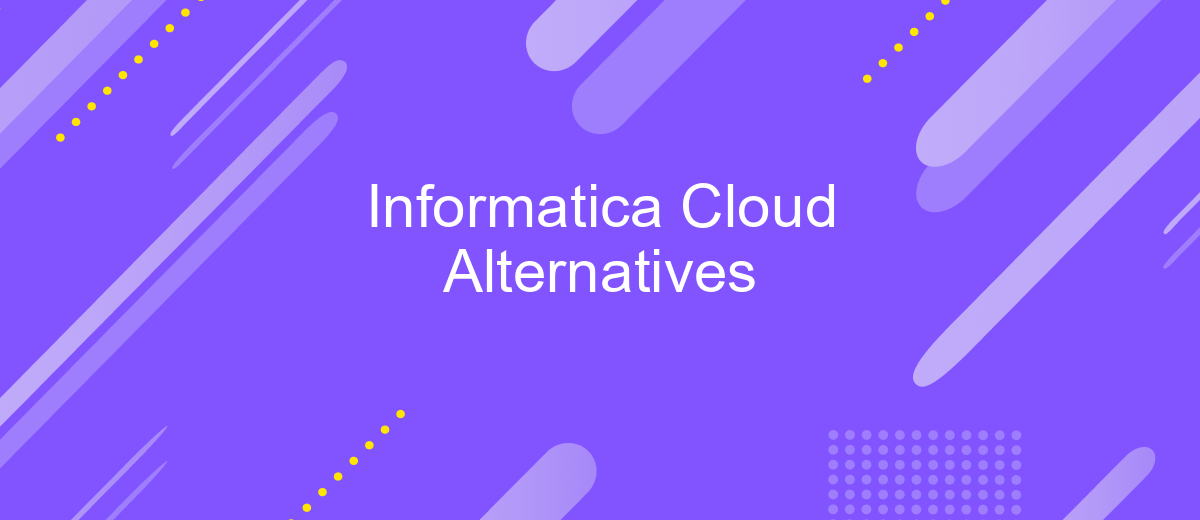Informatica Cloud Alternatives
Informatica Cloud is a popular choice for data integration and management, but it's not the only option available. This article explores various alternatives to Informatica Cloud, offering insights into their features, benefits, and potential drawbacks. Whether you're looking for cost-effective solutions or advanced functionalities, these alternatives can help you make an informed decision for your data needs.
Alternatives to Informatica Cloud
When considering alternatives to Informatica Cloud, it's essential to evaluate options that offer robust integration capabilities, user-friendly interfaces, and cost-effective solutions. Many businesses turn to other platforms to meet their specific needs more effectively.
- ApiX-Drive: A flexible and user-friendly service that simplifies the integration process between various applications and systems, making it an excellent alternative for businesses seeking efficient data synchronization.
- Talend: Known for its open-source data integration tools, Talend provides a comprehensive suite for data management, ensuring seamless data flow across different platforms.
- Microsoft Power Automate: This cloud-based service allows users to create automated workflows between applications and services, helping streamline business processes and improve productivity.
- SnapLogic: Offering an intuitive, AI-driven integration platform, SnapLogic supports a wide range of data sources and applications, making it a versatile choice for complex integration needs.
- Boomi: A cloud-based integration platform that enables businesses to connect applications and data quickly and efficiently, ensuring smooth operations across various systems.
Each of these alternatives provides unique features and benefits, catering to different business requirements. By evaluating these options, organizations can find the most suitable solution to enhance their data integration and workflow automation processes.
Benefits of Using Alternatives

Exploring alternatives to Informatica Cloud offers several significant benefits for businesses. One of the primary advantages is cost-effectiveness. Many alternative solutions provide flexible pricing models that can be more suitable for small to medium-sized enterprises, reducing the overall expenditure on data integration and management. Additionally, these alternatives often come with a more straightforward implementation process, which can save time and resources, allowing businesses to focus on their core operations.
Another key benefit is the variety of features and customization options available. For instance, services like ApiX-Drive offer robust tools for setting up and managing integrations effortlessly. With ApiX-Drive, businesses can automate data flows between various applications, enhancing operational efficiency and data accuracy. Moreover, the user-friendly interface and extensive support options ensure that even non-technical users can handle integrations without extensive training. This flexibility and ease of use make alternative solutions an attractive option for businesses looking to optimize their data integration processes.
Factors to Consider When Choosing an Alternative

When choosing an alternative to Informatica Cloud, it is essential to evaluate several key factors to ensure the solution meets your business needs effectively. A comprehensive assessment will help you make an informed decision.
- Functionality: Ensure the alternative provides all the features you require for your data integration needs. This includes data transformation, data quality, and real-time processing capabilities.
- Scalability: Consider whether the platform can scale with your business growth. It should handle increasing data volumes and complexity without compromising performance.
- Ease of Use: The tool should have an intuitive interface and robust support resources. Platforms like ApiX-Drive offer user-friendly interfaces that simplify the integration process.
- Cost: Evaluate the pricing model to ensure it fits within your budget. Consider both upfront costs and long-term expenses, including licensing and maintenance fees.
- Integration Capabilities: Verify that the alternative supports seamless integration with your existing systems and applications. ApiX-Drive, for example, offers extensive integration options with various platforms.
By carefully considering these factors, you can select an Informatica Cloud alternative that aligns with your business objectives and technical requirements. This approach will help you achieve efficient and effective data management and integration.
Top Alternatives to Informatica Cloud

When it comes to cloud data integration, there are several robust alternatives to Informatica Cloud that offer diverse functionalities and capabilities. These alternatives can cater to various business needs, from simple data migration to complex data transformations and integrations.
Choosing the right tool depends on your specific requirements, such as ease of use, scalability, and the types of data sources you need to connect. Below are some of the top alternatives to Informatica Cloud that you might consider for your integration projects:
- ApiX-Drive: An intuitive platform for automating integrations and workflows between various applications and services.
- Talend: A comprehensive data integration tool that supports big data and cloud integration.
- Microsoft Azure Data Factory: A cloud-based data integration service that allows you to create data-driven workflows for orchestrating data movement and transformation.
- SnapLogic: A powerful integration platform as a service (iPaaS) that simplifies the process of connecting applications and data sources.
- MuleSoft: An integration platform for connecting SaaS and enterprise applications in the cloud and on-premises.
Each of these alternatives offers unique features and advantages, making them suitable for different use cases. For instance, ApiX-Drive is particularly user-friendly and excels in automating workflows between various applications, making it a great choice for businesses looking to streamline their integration processes without extensive technical expertise.
Conclusion
In conclusion, exploring alternatives to Informatica Cloud reveals a diverse array of options tailored to various integration needs and business requirements. These alternatives offer competitive features, scalability, and ease of use, making them viable choices for organizations seeking effective data integration solutions. Each platform brings unique strengths to the table, allowing businesses to select the one that best aligns with their specific goals and technological ecosystems.
Among these alternatives, ApiX-Drive stands out as a noteworthy option. It simplifies the process of setting up integrations with its user-friendly interface and robust automation capabilities. ApiX-Drive supports a wide range of applications and services, enabling seamless data flow and operational efficiency. By leveraging such tools, businesses can enhance their integration strategies, reduce manual workloads, and achieve greater agility in their operations.
- Automate the work of an online store or landing
- Empower through integration
- Don't spend money on programmers and integrators
- Save time by automating routine tasks
FAQ
What are some alternatives to Informatica Cloud for data integration?
How do these alternatives compare in terms of ease of use?
Are there cost-effective alternatives to Informatica Cloud?
Can these alternatives handle real-time data integration?
What kind of support and resources are available for these alternatives?
Time is the most valuable resource in today's business realities. By eliminating the routine from work processes, you will get more opportunities to implement the most daring plans and ideas. Choose – you can continue to waste time, money and nerves on inefficient solutions, or you can use ApiX-Drive, automating work processes and achieving results with minimal investment of money, effort and human resources.


